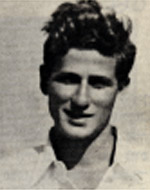Rotberg, Roy
Son of Shemaryahu and Yael. He was born on April 24, 1935 in Tel Aviv. He was a member of a pioneer family, on whose knees he was raised and raised, in which he absorbed loyalty to the people and dedication to the homeland and absorbed the tendency to self-sacrifice and non-recoil from difficulties and dangers. He completed his studies at the Nes Tziona elementary school in Tel Aviv, and even then, on the occasion of his thirteenth birthday, he was able to prove his responsibility and his connection to security in running around with messages between the positions during the War of Independence. The farmer, Mikveh Israel, who shaped his image – a working-earth figure of immense love After one year of study at Mikvah Israel he attended the “Shevach” vocational school in Tel Aviv, helping his parents with every step to work in time In the early years of his youth, he joined the United Movement, and in his sixteenth year he became a dedicated teacher who took care of his students’ activities and even his cultural life. . His approach to studies was serious and he called for the expansion of his knowledge and then preached the need for educated farmers with proper practical and theoretical training so that they could bear the heavy burden of settling the desolation of the land. His term in the Mikveh caused him great grief but was Simcha when he was given the opportunity to contact the land and participate in building a group and settling the wilderness. He volunteered for the IDF as part of the Nahal Brigade when he was below the age of enlistment; That was in July 1952. He completed an officers’ course. When the decision to immigrate to Nahal Oz was made, he was assigned the task of security and he was appointed commander of the area. Acquired military information from reading military literature and even in a training framework, and carried on with his heavy burden of responsibility. The first was for everything-by volunteering for all and carrying out every difficult exercise-and with his primacy and will served as a wonderful personal example for each of his friends. At every step, the line of economic life stood in his way as the main criterion for adapting to the sense of justice, and therefore he knew how to transcend hatred rather than be dazzled by it, despite what his life and work were in the shadow of enemy guns. By nature he did not know despair; He fought him and he could and always had his head erect and his walk proud. There was nothing in the value of something as small and big as his seriousness. He knew how to work non-stop and without fatigue, for there was one thing about him: the duty to do. It is believed that power was not created to destroy since power is the father of creation and building. He did not say much, but when he spoke, his words were equal and interested, and he received respect from the elders. Although he was always subject to the enemy’s perilous dangers in fulfilling the role of loyal guard of the borders of Israel, he had a joy of life and a sense of humor. He loved music and his strong attraction to beauty was evident in his daily behavior, his approach to order, his meticulousness in matters of clothing, ‘. His gentleness and love of others were also liked by his brother-friends. On Lag Ba’Omer, April 29, 1956, the observation message came that Arabs were harvesting in a field near the border, and then his constant alertness, lively temper, and courage came to him: he immediately bandaged his mare and left. He fell on guard duty from the Arabs who dragged him across the border, and on the day he was given the rank of lieutenant, he was laid to rest in the graveyard of his farm, among his captors was the then chief of staff, Lieutenant General Moshe Dayan. He left a wife and a child. The Nahal Oz group published a booklet in his memory entitled “Roi”. Words in memory and image were uploaded in “Avim”, a school bag issued in 1960 by the local council of Ramat Hasharon
